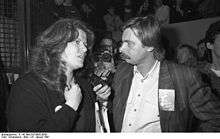Jutta Ditfurth

Jutta Ditfurth (in full Jutta Gerta Armgard von Ditfurth, September 29, 1951 in Würzburg) is a German sociologist, writer, and radical ecologist politician. Being born into the noble house of Ditfurth, members of which had been noble ministeriales invested with hereditary administrative titles and offices in various regions of today's Saxony-Anhalt and Lower Saxony and elsewhere in the Holy Roman Empire, a daughter of the German physician and science journalist Hoimar von Ditfurth and a sister of the historian Christian v. Ditfurth, in 1978 she attempted to have her name legally changed to remove the nobiliary particle "von" and to become the plainer Jutta Ditfurth, but was refused the change by the authorities. She is nonetheless known throughout Germany by her adopted non-noble name, which she prefers.
Ditfurth studied art history, sociolology, political science, economic history, and philosophy in Germany, Scotland, and the USA, at the universities of Heidelberg, Hamburg, Freiburg, Glasgow, Detroit, and Bielefeld, graduating as a sociologist in 1977. After her final graduation, she worked as a sociologist, journalist, and writer, and also as a shift worker.
Ditfurth has been politically active within the New Left since the early 1970s, joining internationalist and feminist groups, as well as participating in the nascent Green and anti-nuclear movement. Around 1980, she co-founded the German Green Party. In the 1980s, she was approached by the CIA to work for it, but she refused. Towards the late 1980s, she became highly critical of the subsequent trajectory of the German Green Party, which she described as counterrevolutionary, hierarchical, and nepotistic; she left the Greens in 1991.[1][2][3]
As a candidate on an international list of the Greek Left-wing party New Left Current during the 1999 European elections, she ran a campaign critical of the military German and NATO involvement in the Kosovo War, but did not win enough votes to win a seat in the European Parliament. In 2000, she co-founded the minor German party Ecological Left, of which she remains a member and on whose ticket she won a seat in the city parliament of Frankfurt in 2001 and 2011. In 2007, she published a biography of the Red Army Faction member Ulrike Meinhof.
She is currently based in Frankfurt. Her works remain largely untranslated into English.
Going beyond the Greens, radical ecology has to fill the enormous vacuum that once constituted the left--our movement must be against capitalism, it must be independent, and people in it must be accountable. With the Greens we were too naive--it was too easy for people like Joschka Fischer to take over the Green project for his own purposes. Now we have to keep this from happening again. And we must be prepared to work patiently to build this movement.— Jutta Ditfurth, [4]
Publications
- Der Baron, die Juden und die Nazis. Reise in eine Familiengeschichte. ("The Baron, the Jews, and the Nazis: Journey Into a Family History"), Hoffmann und Campe, Hamburg, 2013, ISBN 978-3-455-50273-2 (on her family ties to Nazism prior to 1945)
- Zeit des Zorns. Warum wir uns vom Kapitalismus befreien müssen [German] ("Time of Anger: Why We Must Free Ourselves from Capitalism"). Westend Verlag, Frankfurt/Main. 2012. ISBN 978-3-86489-027-7.
- Zeit des Zorns: Streitschrift für eine gerechte Gesellschaft. [German] (Time of Anger: The Argument for a Just Society"). Droemer Knaur, München. 2009. ISBN 978-3-426-27504-7.
- "Zahltag, Junker Joschka! (Payday, Junker Joschka!) - German pdf" (PDF). Retrieved 2013-01-20.
- Ulrike Meinhof. Ullstein Verlag GmbH. 2007. ISBN 978-3550087288. [German]
- Entspannt in die Barbarei: Esoterik, (Öko-)Faschismus und Biozentrismus ("Stress-Relieved Ways Into Barbarism: Esotericism, (Eco-)Fascism, and Biocentrism"). Konkret Literatur. 1996. ISBN 978-3894581480. [German] (on the political trajectory of the Green Party which she critizizes ever since leaving them)
- Lebe wild und gefährlich. Radikalökologische Perspektiven. [German] (Live Wild and Dangerous. Radical Ecological Perspectives"). Kiepenheuer & Witsch, Köln. 1991.
- Träumen, Kämpfen, Verwirklichen. Politische Texte bis 1987. [German] ("Dreams, Struggles, Implementations: Political Writings until 1987"). Kiepenheuer & Witsch, Köln. 1988. ISBN 3-462-01903-1.
- with Rose Glaser (1987). Die tägliche legale Verseuchung unserer Flüsse und wie wir uns dagegen wehren können, Ein Handbuch mit Aktionsteil. [German] ("The Daily Legal Pollution of Our Rivers and How to Defend Ourselves Against It. An Action Handbook."). Rasch und Röhring, Hamburg/Zürich. ISBN 3-89136-163-7.
References
- ↑ "European Reports: Radical Ecology after the German Greens". Institute for Social Ecology: Left Green Perspectives #25. 1992-01-01. Retrieved 2013-01-20.
- ↑ Jutta Ditfurth. "Zahltag, Junker Joschka! (Payday, Junker Joschka!) [German pdf]" (PDF). Retrieved 2013-01-20.
- ↑ "Jutta Ditfurth and extraparliamentary movements of the seventies". Communimedia+. Retrieved 2013-01-20.
- ↑ "Jutta Ditfurth and extraparliamentary movements of the seventies". Communimedia+. Retrieved 2013-01-20.
External links
- www.jutta-ditfurth.de Jutta Ditfurth's website [German]
- "European Reports: Radical Ecology after the German Greens". Institute for Social Ecology: Left Green Perspectives #25. 1992-01-01. Retrieved 2013-01-20.